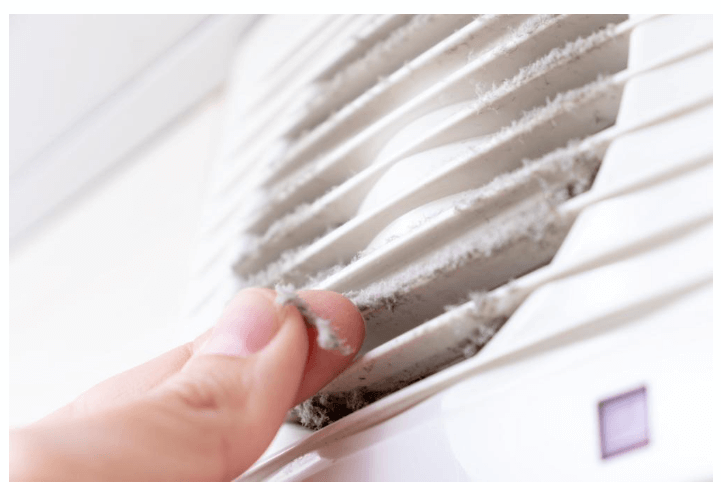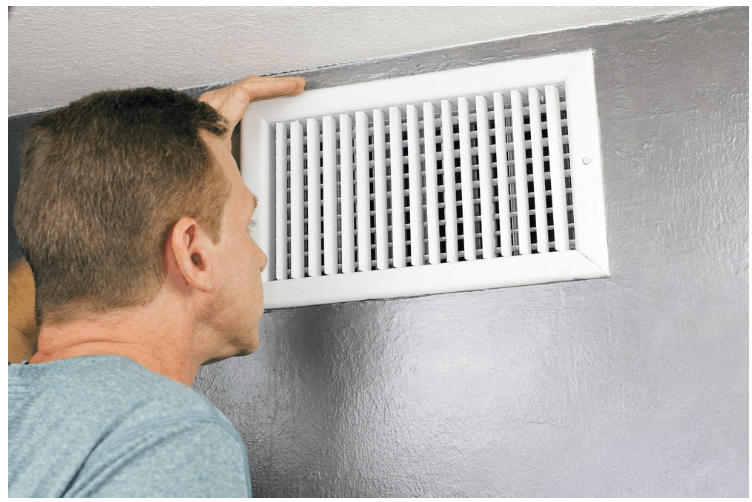The EPA reports that the average American spends 90% of their time indoors. The air you breathe with every breath is vital to your health, and the air in the rooms and spaces you inhabit can directly impact your well-being.
The air quality in our homes is often directly linked to the circulation of air through the space. Generally, the better the air circulation in your house, the cleaner the air will be and the less your HVAC system will have to work to heat and cool your home. Proper air circulation can improve the air quality in your home, lower your energy bills, and prolong the life of your HVAC system.
Whether you design a mini split system, install more fans, or have a thorough duct cleaning, taking steps to improve your home’s air quality is a worthwhile investment in your health. Explore these seven tips to improve your home’s air quality.
1.Install or Turn On Fans
Fans are one of the best and most energy-efficient ways to improve circulation in your home. A 48″ ceiling fan can cool and move the air through a room using significantly less energy than other options. In most parts of the U.S., running your fan for an afternoon would only cost you $.02. Fans can also reduce the load on air conditioning units or other HVAC systems, helping you save on your utility bills.
Installing ceiling fans or purchasing a desk, box, or stand fans can evenly distribute cool air throughout your home and help prevent the accumulation of pollutants, dust, and allergens. If you don’t have fans, purchase one for every bedroom, dining area, living room, and family room. Run them for a few hours daily to promote circulation and run them any time someone uses the room.
2.Open Doors and Windows
One of the simplest, cheapest, and easiest ways to improve circulation in your home is to simply open your windows and doors and let in some fresh air. Studies have shown that indoor air is often up to 100 times as polluted as the air outdoors. Letting in the air could help circulate the air better.
When the weather is warm, try to open your windows and doors to take advantage of prevailing winds. If the wind is blowing from the east, open windows on your home’s east and west sides to get a through-flow. Open any internal doors that block airflow and get a steady, comfortable breeze through your house.
If you do not have screens on your windows or screen doors, consider adding them to prevent the infiltration of mosquitoes and other bugs in the summertime.

3.Purchase House Plants
Plants are nature’s air purifiers. Through photosynthesis, they breathe in harmful carbon dioxide and convert it into oxygen using only sunlight as fuel. Putting plants around your home will naturally clean and circulate the air and provide psychological benefits. Scientists have discovered that plants in the home can make people calmer, more relaxed, and more focused.
Some of the best plants to keep in your house for good air circulation are:
- Peace Lily
- Date Palm
- Bamboo
- Rubber Plant
- Areca Palm
- Boston Fern
4.Install and Turn On Kitchen and Bathroom Vents
Your kitchen and bathrooms often have the worst air quality of any room in your home. Byproducts from cooking, including carbon dioxide, carbon monoxide, bad smells, and smoke, can build up in your kitchen. The humid air of a bathroom is the perfect breeding ground for bacteria, mold, and fungi.
Installing and regularly running vent and exhaust fans in these areas can remove many pollutants and improve the air quality. Cleaner air will also be brought in from other rooms, improving general air circulation throughout your home.
5.Have Your Ducts Cleaned
If you have a central air conditioning system, it uses ducts to carry warm and cool air around your home. Ducts clogged with dust and debris will not allow air to circulate properly, increasing strain on your HVAC system and the number of harmful particles in your home’s air.
Regular, thorough cleaning of your ducts should prevent blockages and keep air flowing properly throughout your home. If you have regular issues with clogged ducts, consider switching to a ductless Mitsubishi mini split home cooling system. Mini splits do not use ducts and are fitted with HEPA-grade filters to purify the air in addition to heating and cooling your home. They’re also more energy-efficient because no energy is lost through the ductwork.

6.Replace Air Filters
Many homes have HVAC systems with built-in air filters. However, these air filters are only effective for a limited amount of time and, as they fill with pollutants, they restrict airflow and strain your heating and cooling system.
A good general guide for replacing your air filters is the inch-per-month rule. A 1″ thick air filter should be replaced every two months, with an additional month for every inch of filter after that, so a 2″ filter should be every three months, a 4″ filter every six months. Check your system and consult an HVAC specialist for more precise guidelines for your system.
7.Use a Portable Air Cleaner
If you are concerned about your home’s circulation and air quality, investing in a portable air cleaner can be an excellent option. These small devices clean and circulate air and can easily move between rooms. You can place one next to your bed while you sleep, move it into your kitchen while you cook, and keep it next to your desk if you work from home.
These small devices can be a great supplement to a home ventilation system or an extra boost for people with allergies. They can also be an excellent choice for people looking to keep their windows and doors open for ventilation, but who still want purified air in the rooms they spend time in.
Improve Your Air Circulation, Improve Your Health
Improving the circulation and quality of the air in your home can make you healthier and happier and save you money on heating and cooling costs. Whether it’s opening your doors and windows on pleasant days or upgrading your HVAC system to a modern, high-quality Gree Flexx Home HVAC system to keep air moving and clean in every room of your house, maintaining good circulation is necessary for all homes and should be a priority for all homeowers.
